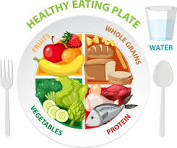Welcome to Healthy You!
Our page is dedicated to keeping our body and mind healthy, through all ages and stages.

Healthy You Blog


Nourishing Your Golden Years: The Advantages of Healthy Eating as We Age
Aging is a natural and inevitable part of life, bringing with it a wealth of wisdom and experiences. However, it also presents unique challenges, particularly when it comes to maintaining health and vitality. One of the most profound ways to support a healthy aging process is through nutrition. By embracing healthy eating habits, we can enhance our quality of life, boost longevity, and ensure our later years are as fulfilling as possible.
### The Importance of Nutrition in Aging
As we age, our bodies undergo numerous changes. Metabolism slows down, muscle mass diminishes, and bone density can decrease. These changes can increase the risk of chronic diseases, including heart disease, diabetes, and osteoporosis. However, a well-balanced diet can mitigate these risks by providing essential nutrients that support bodily functions and promote overall well-being.
### Key Advantages of Healthy Eating for Seniors
1. **Enhanced Energy Levels:**
A nutrient-rich diet can provide the energy needed to stay active and engaged in daily activities. Whole grains, lean proteins, and healthy fats are excellent sources of sustained energy, helping to combat fatigue and keep you feeling lively.
2. **Improved Cognitive Function:**
Certain nutrients are vital for brain health. Omega-3 fatty acids, found in fish like salmon and sardines, are known for their role in maintaining cognitive function. Antioxidant-rich foods, such as berries and leafy greens, can help protect the brain from oxidative stress and reduce the risk of neurodegenerative diseases.
3. **Stronger Bones and Muscles:**
Calcium and vitamin D are crucial for bone health, helping to prevent osteoporosis and fractures. Incorporating dairy products, fortified plant-based milks, and leafy greens into your diet can ensure you get adequate amounts of these nutrients. Additionally, proteins are essential for maintaining muscle mass; consider lean meats, beans, and legumes as part of your meals.
4. **Better Heart Health:**
Heart disease remains a leading cause of death among seniors. A diet low in saturated fats, sodium, and cholesterol, and rich in fruits, vegetables, and whole grains can support heart health. Foods like nuts, seeds, and avocados provide healthy fats that help maintain cholesterol levels and reduce the risk of cardiovascular issues.
5. **Weight Management:**
Maintaining a healthy weight is crucial as we age, as it reduces the risk of chronic diseases and enhances mobility. Nutrient-dense foods that are low in empty calories can help manage weight effectively. Focus on portion control and mindful eating to avoid unnecessary weight gain.
6. **Enhanced Immune Function:**
A strong immune system is essential for fighting off illnesses. Foods rich in vitamins A, C, and E, as well as zinc and selenium, can support immune function. Citrus fruits, nuts, seeds, and colorful vegetables should be staples in a senior's diet.
7. **Better Digestive Health:**
Fiber is essential for maintaining a healthy digestive system, preventing constipation and promoting regular bowel movements. Whole grains, fruits, vegetables, and legumes are excellent sources of dietary fiber.
### Practical Tips for Healthy Eating
- **Plan Balanced Meals:** Aim for a variety of foods in each meal, including proteins, carbohydrates, and fats, to ensure you’re getting a range of nutrients.
- **Stay Hydrated:** Dehydration can exacerbate health issues in seniors. Drink plenty of water throughout the day and include hydrating foods like cucumbers and watermelon.
- **Limit Processed Foods:** These often contain high levels of salt, sugar, and unhealthy fats. Opt for fresh, whole foods whenever possible.
- **Consult a Nutritionist:** If you have specific health concerns or dietary needs, a registered dietitian can provide personalized guidance.
### Conclusion
Healthy eating is a powerful tool for promoting longevity and enhancing quality of life as we age. By making informed dietary choices, we can support our physical and mental health, allowing us to enjoy our golden years to the fullest. Remember, it’s never too late to start; small changes can make a big difference. Embrace the journey toward better health with nourishing foods that fuel your body and spirit.
### Embracing Fitness After 50: The Advantages of Age-Appropriate Exercises
As we gracefully transition into the golden years of our lives, staying active becomes more crucial than ever. Exercise is not just a young person’s game; in fact, age-appropriate exercises for those aged 50 and above are vital for maintaining health, mobility, and overall well-being. Whether you’ve been a lifelong fitness enthusiast or are just beginning your exercise journey, embracing a routine tailored to your age group can bring about a multitude of benefits.
#### 1. **Enhancing Physical Health**
One of the most immediate advantages of engaging in age-appropriate exercises is the improvement of physical health. Regular physical activity helps maintain a healthy weight, reduces the risk of chronic diseases such as heart disease, diabetes, and osteoporosis, and enhances cardiovascular health. For those over 50, exercises that focus on strength, flexibility, and balance are particularly beneficial. Strength training helps counteract the natural loss of muscle mass, while flexibility exercises like yoga or Pilates maintain joint health and reduce the risk of injury.
#### 2. **Boosting Mental Health**
Exercise has long been known to have a positive impact on mental health, and this holds true at any age. For individuals over 50, engaging in regular physical activity can help alleviate symptoms of depression and anxiety, improve mood, and enhance cognitive function. Physical activities stimulate the release of endorphins, often referred to as the body's natural mood elevators. Additionally, staying active can help maintain brain health and may reduce the risk of cognitive decline and diseases such as Alzheimer’s.
#### 3. **Improving Balance and Coordination**
Falls are a significant concern for older adults, often leading to serious injuries. Incorporating exercises that focus on balance and coordination can significantly reduce the risk of falls. Activities such as tai chi, yoga, and specific balance exercises strengthen the muscles and improve stability, making daily tasks safer and more manageable.
#### 4. **Enhancing Social Connections**
Participating in group exercises or fitness classes offers the added benefit of social interaction. For many in the 50+ age group, maintaining social connections is essential for mental and emotional well-being. Joining a walking group, attending yoga classes, or participating in community sports can provide opportunities to meet new people, strengthen existing relationships, and create a supportive community focused on healthy living.
#### 5. **Adapting to Individual Needs**
One of the key advantages of age-appropriate exercises is the ability to adapt routines to individual needs and limitations. Whether dealing with arthritis, recovering from surgery, or managing chronic health conditions, there is a wide range of exercises that can be modified to accommodate different fitness levels and health concerns. Working with a fitness professional or physical therapist can help tailor a program that meets your specific needs and goals.
#### 6. **Promoting Longevity and Quality of Life**
Regular exercise is a cornerstone of healthy aging, contributing to increased longevity and a higher quality of life. Engaging in physical activity helps maintain independence by improving strength and mobility, making it easier to perform daily tasks and enjoy hobbies and activities. Moreover, staying active supports a more vibrant and fulfilling life, allowing individuals to embrace their later years with vitality and enthusiasm.
#### Conclusion
The journey to fitness and well-being doesn’t end at 50; in many ways, it’s just beginning. Embracing age-appropriate exercises can transform the way individuals experience aging, offering numerous physical, mental, and social benefits. Whether you’re looking to improve your health, boost your mood, or simply enjoy life more fully, integrating regular exercise into your routine is a powerful step toward a healthier, happier future. Remember, it’s never too late to start, and every step counts toward a more active, fulfilling life.